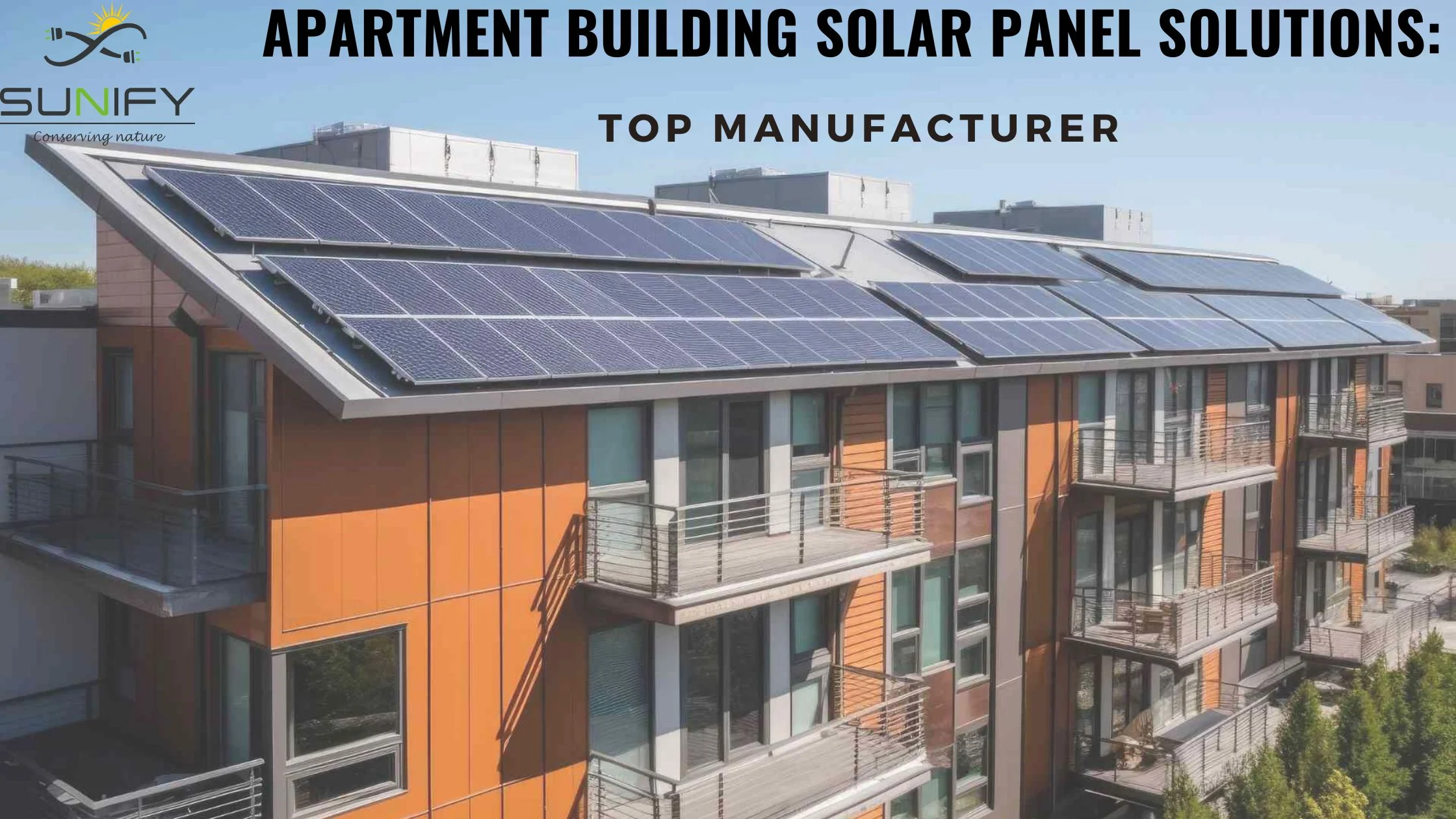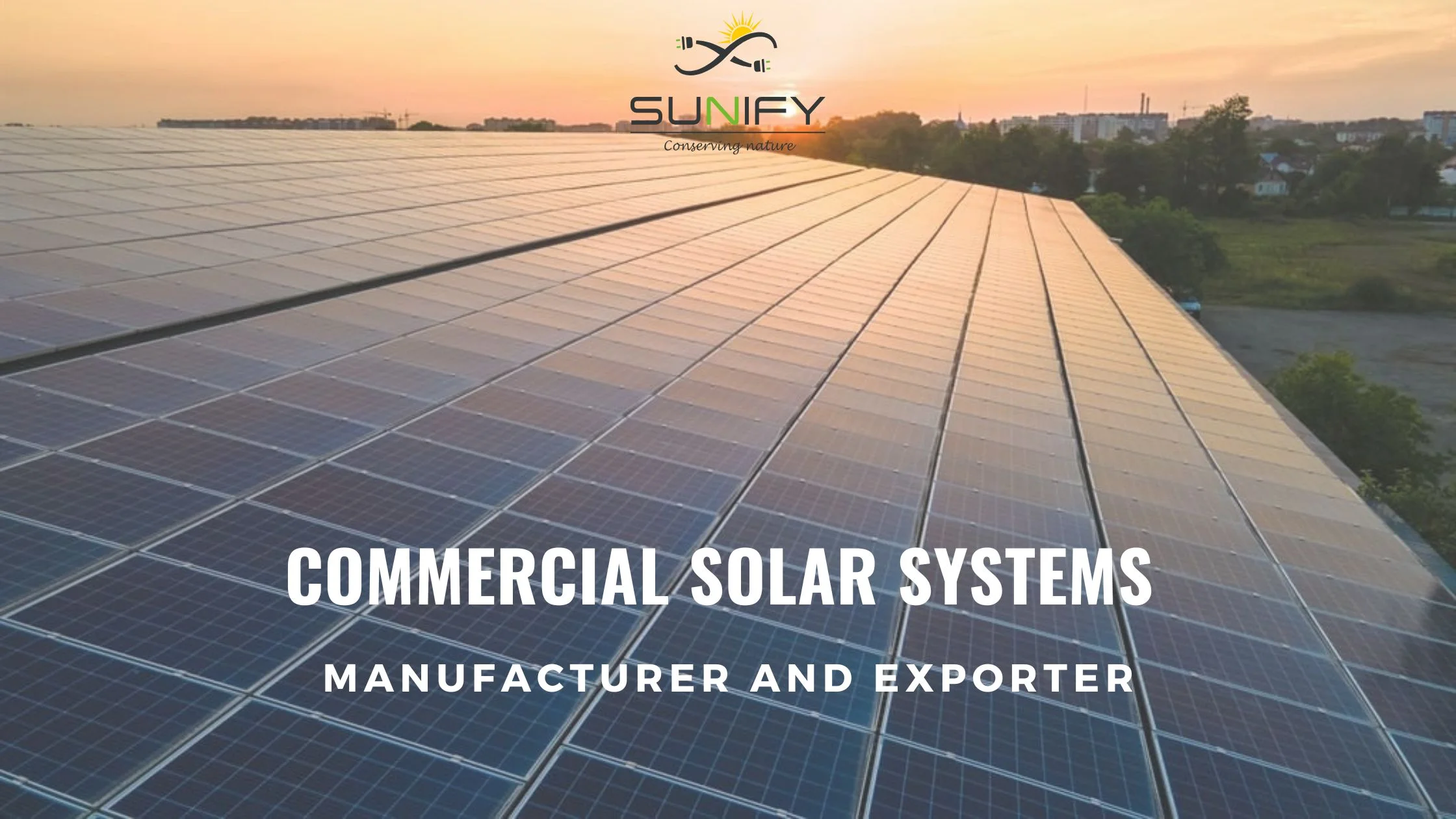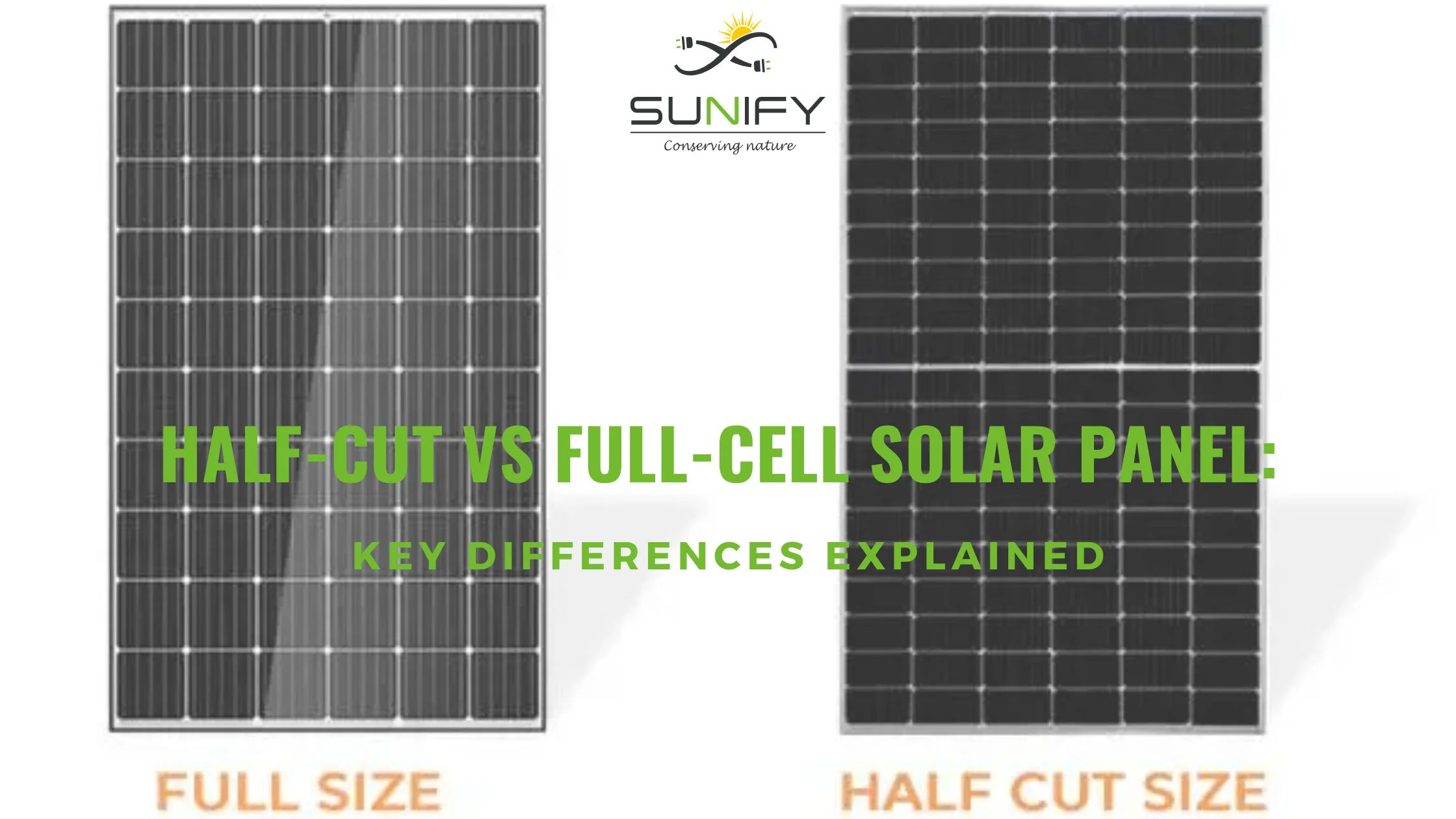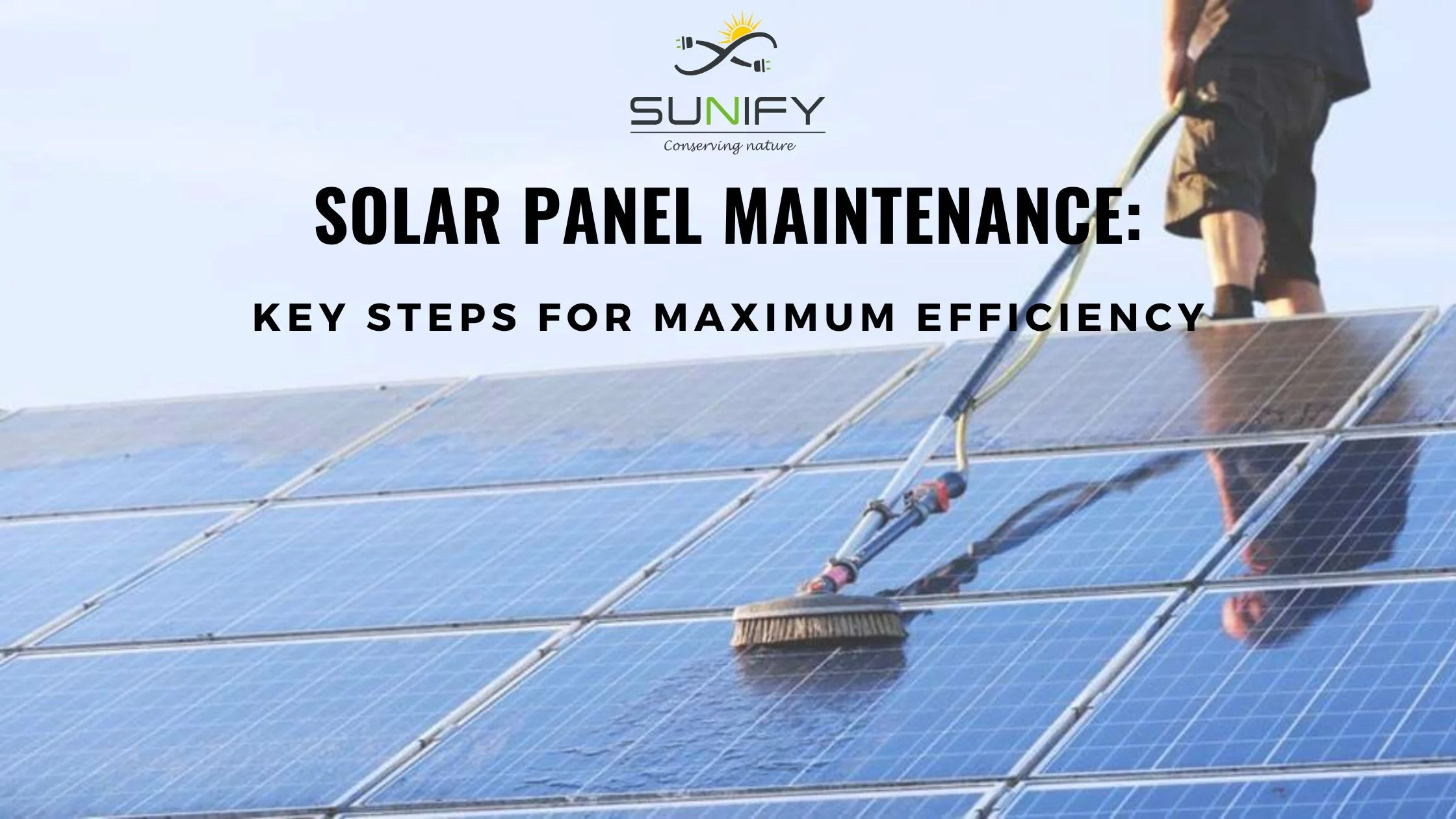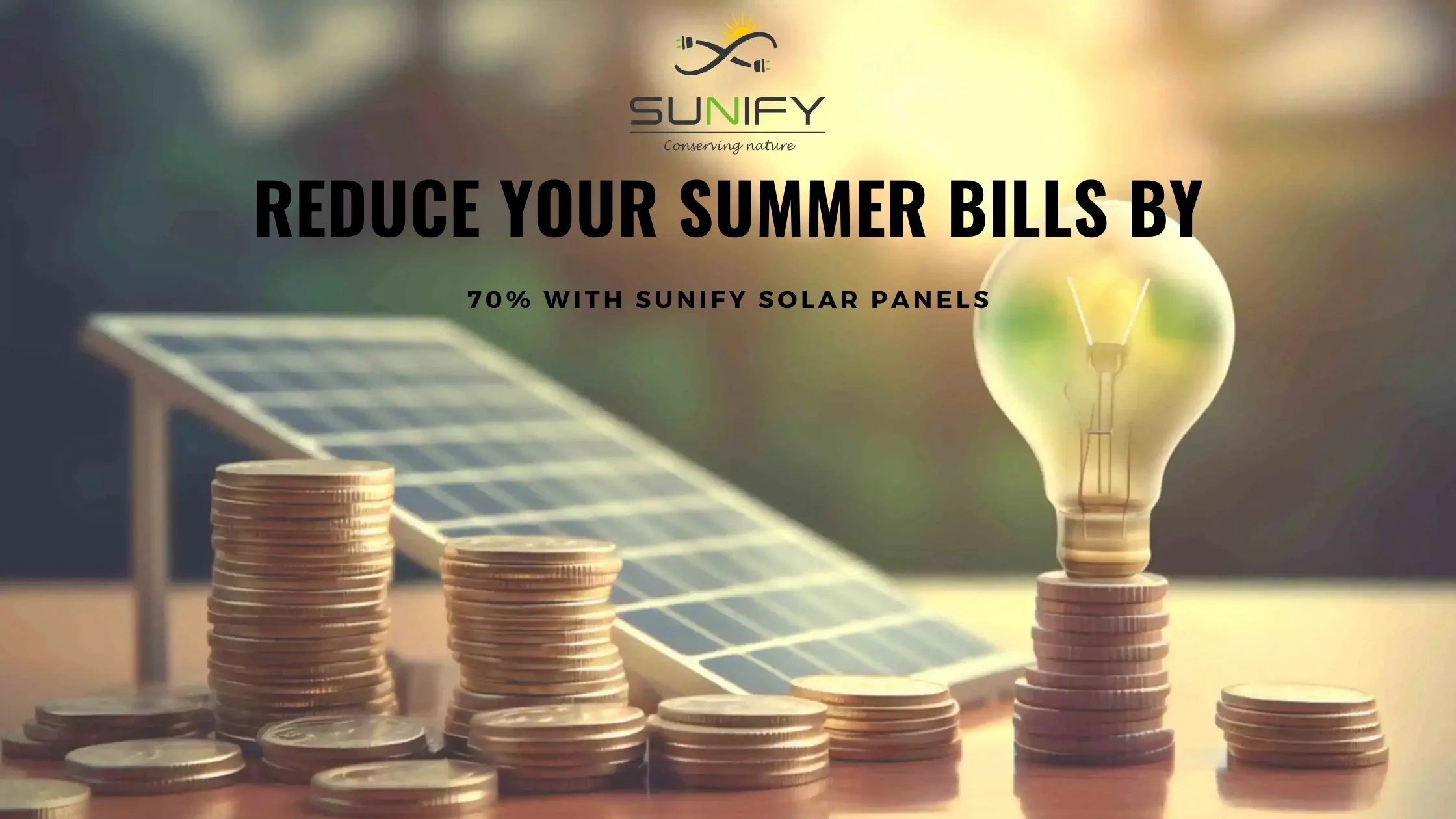
Connect With Our Team
The question "Are solar panels for business a good investment?" has become increasingly relevant as commercial energy costs continue rising and environmental sustainability becomes a business priority. The financial motives and long-term advantages and the ability to obtain returns on investment (ROI) from commercial solar panels are vital in the strategic position of business owners who want to adopt renewable energy. Many businesses are now collaborating with top solar power companies and commercial solar companies to make informed choices about solar for business growth.
The Current State of Commercial Solar Investment
Solar panels for business are one of the most engrossing green-energy investments presently. As the cost of installation drastically reduced, there is more efficiency in technology, positive government incentives and enhanced commercial solar installations have never witnessed such development in all business areas. This rise is largely influenced by the innovation from solar manufacturing companies and popular solar companies offering scalable solutions.
The commercial solar panel investment landscape has evolved significantly over the past decade. The price of installation has fallen by over 70% since 2010, and the efficiency of the solar panels has gone up significantly. Such advances have transformed the business economics of solar panel investments, and have now made these systems, which previously were not financially feasible in most commercial installations, generally cost-effective. Top solar company like Sunify Solar Partnerships and guidance have also played a vital role in shaping the market confidence.
Modern commercial solar installations typically achieve full cost recovery within 6-10 years, followed by decades of essentially free electricity generation. The forecast of this timeline means that solar energy is one of the best long-term investment businesses in its operational infrastructure, especially for those working with solar panels companies known for reliability and warranties.
Financial Benefits of Commercial Solar Panels
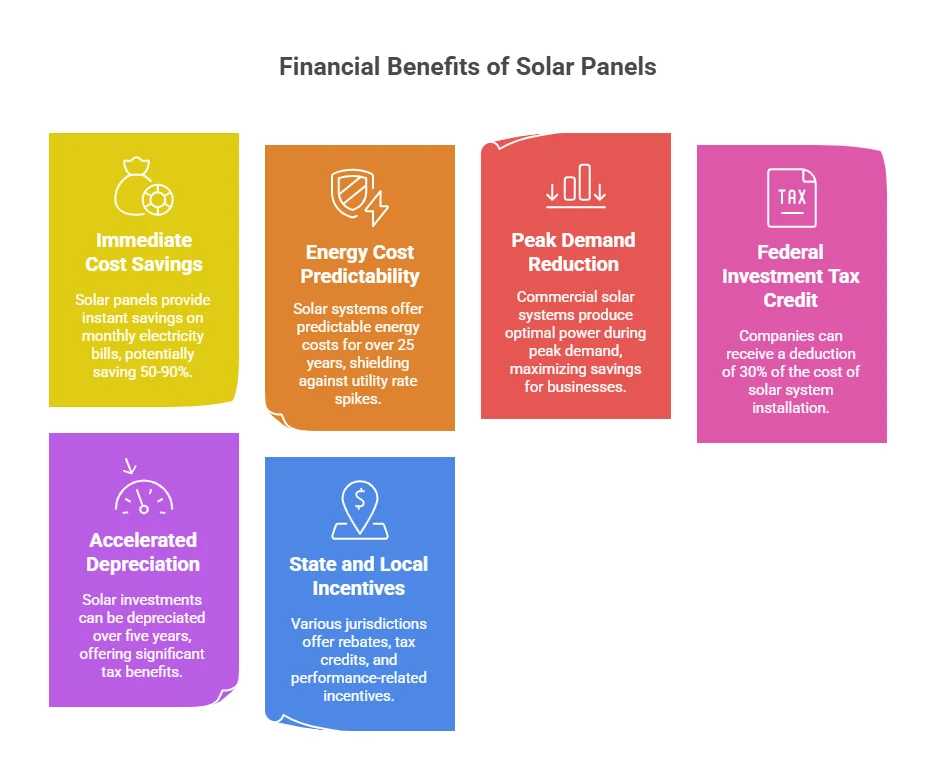
Immediate Cost Savings and Cash Flow Improvements
Business solar panels provide an instantaneous savings in pricing on monthly billing of electricity, and can easily save 50-90% of the typical utility bill. These savings start to accrue when the system goes live, and they will have a quick cash flow benefit.
-
Energy Cost Predictability: Solar systems give a business predictable energy costs over 25+ years, so it is shielded against spikes in the utility rates. With this stability in the cost of energy more longer-term differences and budgeting can be done.
-
Peak Demand Reduction: The commercial solar systems produce optimal power at peak demand time when the electricity is most expensive, and this can harness maximum savings. This is an extremely useful feature in a business that has a very active day of energy use.
Tax Incentives and Financial Accelerators
-
Federal Investment Tax Credit (ITC): The federal ITC enables companies to receive a deduction of business taxes in their federal taxes, which is equal to 30% of the cost of installing the solar systems, offering significant upfront savings. This incentive significantly improves the solar panel ROI for business applications.
-
Accelerated Depreciation: Solar investments can be eased through the Modified Accelerated Cost Recovery System (MACRS), which allows the investment to be depreciated over five years rather than the more common 25-30 years of an installed system's lifespan. This hastened write-off has the great tax benefits in the initial years of ownership.
-
State and Local incentives: Other rebates, tax credits and performance-related incentives are provided in various jurisdictions and these offer even better improvement of commercial solar panel investments.
Return on Investment Analysis
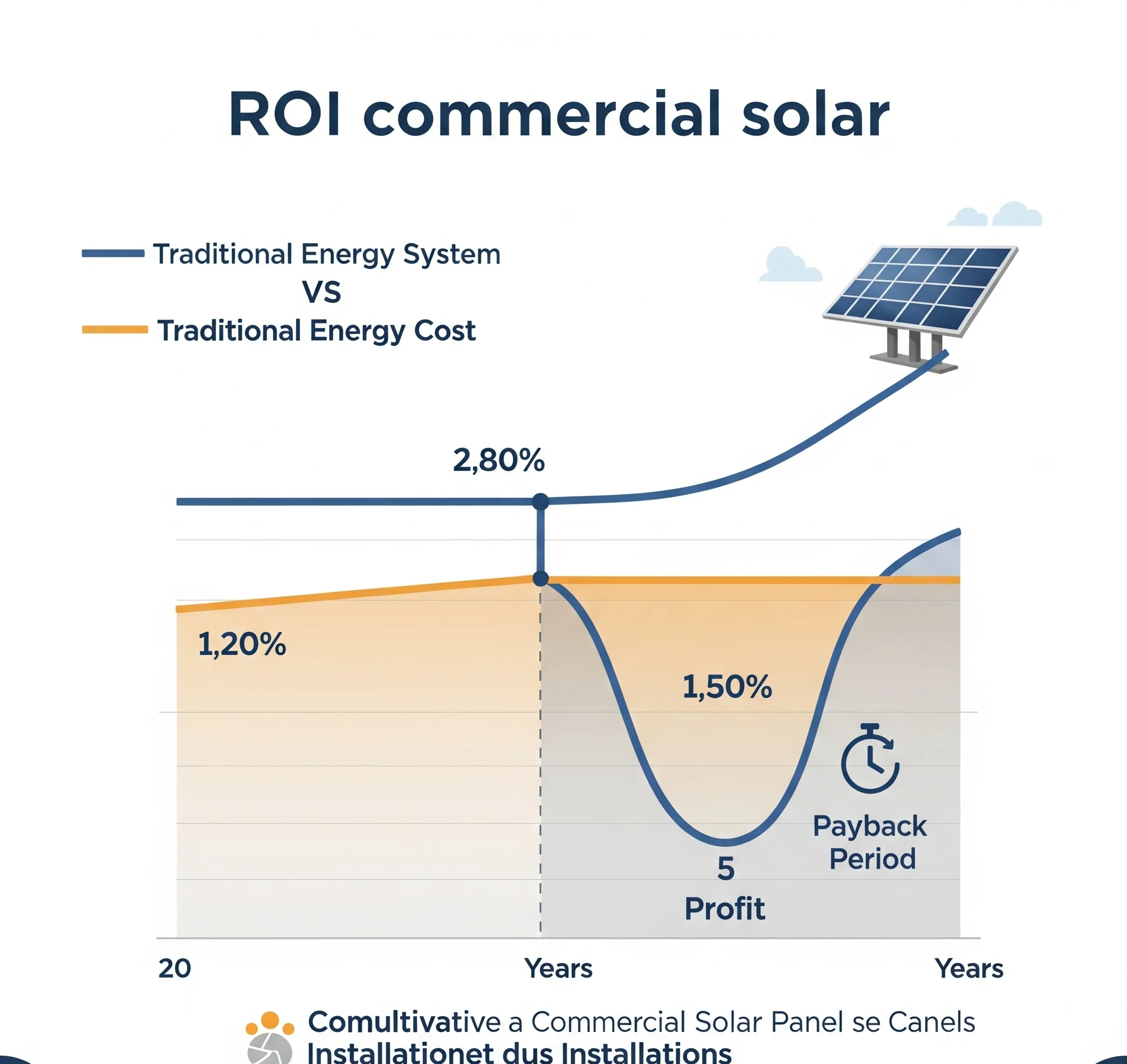
Calculating Solar Panel ROI for Business
Determining whether solar panels are a good investment for business requires comprehensive financial analysis considering multiple variables:
-
Initial Investment Costs: Residential solar installations in modern commercial settings have a per-watt cost of approximately $2.50-$4.00 per watt installed. When considering the size and complexity of the system and its location. Bigger installations are able to obtain more favorable per-watt prices because of the economies of scale.
-
Annual Energy Savings: The average savings per kilowatt installed (depending upon the local rates of electricity and energy consumption habits) is between one thousand and five thousand dollars every year. Such savings can be added throughout the 25+ year life of the system.
-
Payback Period Calculation: Commercial solar systems have a typical payback period of 6-10 years with additional benefits where the system continues to produce free power, more or less, during the rest of its working life.
Example ROI Snapshot:
-
Initial solar panel system cost = $100,000
-
Annual energy savings = $15,000
-
Payback period = ~6.5 years
-
Profit over 25 years = $275,000+ (after costs)
Long-Term Financial Returns
-
25-Year Net Present Value: Good commercial solar installations usually rake in net present values of 150-300% of the initial cost of investment during the operation period. This is one of the most powerful long-term returns to be availed of the business infrastructure investments.
-
Internal Rate of Return: The majority of the business solar panel systems have internal returns of between 15-25% which is very high compared to other forms of conventional business investments or business financial tools.
Business Types That Benefit Most
High Energy Consumption Businesses
-
Manufacturing Facilities: The commercial solar panels are especially beneficial to companies whose energy requirements are large during the day. Solar generation is compatible with manufacturing processes and facilitates the sale of energy at maximum prices and cost reductions.
-
Retail and Commercial Buildings: Bigger retail stores, shopping malls, and office buildings that have a lot of roof area available can take large solar systems and enjoy the outcome of lower operation costs.
-
Agricultural Operations: Farms, greenhouses, and food-processing plants are preferable cases where business solar systems should be implemented since they need a lot of energy and have a lot of space where they can be installed.
Many of these businesses are switching to solar after consulting with solar companies known for offering both solar for your home and scalable commercial systems.
Businesses with Suitable Physical Infrastructure
-
Adequate Roof Space: Businesses with large, unshaded roof areas oriented south can maximize solar generation potential. Flat commercial roofs are particularly well-suited for optimal panel placement and maintenance access.
-
Structural Integrity: Buildings capable of supporting additional roof loads can accommodate solar installations without costly structural modifications. Professional structural assessments ensure safe and compliant installations.
-
Long-Term Location Stability: Businesses planning to remain in current locations for 10+ years maximize the financial benefits of solar panel investments.
Factors Affecting Solar Investment Success
Geographic and Environmental Considerations
-
Solar Irradiance Levels: The localities that receive greater exposure to the sunlight during the year produce more electricity and receive greater financial benefits. Nevertheless, solar resources do not have to be huge to lay the foundation of successful commercial solar investments within the existing technology and incentives.
-
Local Electricity Rates: The regions with a higher utility rate have a larger potential for savings from solar installations. Net metering is another policy that has a great influence on the economics of business solar panels.
-
Climate Considerations: The newer types of solar panels have an acceptable level of reliability under many growing climatic conditions and indeed most systems have surpassed the performance warranty given under harsh conditions.
System Design and Technology Factors
-
Panel Quality and Efficiency: More efficient panels produce more electricity per square foot, and this is likely to cover the increment in initial costs with the added energy created. More advanced panels usually present larger returns in the long run, even though more immediate investments have to be made.
-
Inverter Technology: Advanced inverter systems are capable of maximizing the production of energy and have the ability to offer detailed performance monitoring functions. The various advantages of the various inverter types, dependent on installation needs, are string inverters, power optimizers and microinverters.
-
Monitoring and Maintenance: The complex monitoring systems are also in place; meanwhile, the predictive solar maintenance procedures are kept in order to reduce downtime and maximize the energy production within the framework of the functioning system.
Financing Options for Commercial Solar
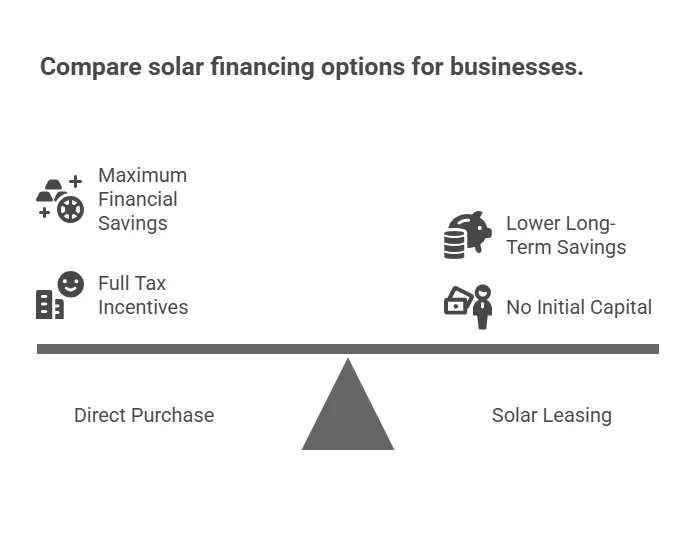
Purchase vs. Lease Considerations
-
Direct Purchase: Direct purchase of solar systems allows businesses that have access to the capital to have maximum financial savings with full access to any available tax incentives, as well as long-term savings.
-
Solar Leasing: Solar benefits may be provided by leasing to companies that do not wish to commit significant capital to initial investments, but cumulative long-term savings may be lower than in a direct ownership investment.
-
Power Purchase Agreements (PPAs): PPAs allow companies to buy solar electricity at fixed rates without accountability for the system ownership, so their cost is immediate and predictable. These plans are often popularized by the best solar company options available today.
Alternative Financing Structures
-
Commercial Solar Loans: Specialized financing products designed for solar installations often provide favorable terms and rates, enabling businesses to achieve positive cash flow from day one.
-
PACE Financing: Property Assessed Clean Energy programs allow businesses to finance solar installations through property tax assessments, spreading costs over extended periods.
Risk Assessment and Mitigation
Contact Solar Expert For More Info
Technology and Performance Risks
-
Equipment Warranties: Warranties that include safeguards against technology failure and performance deterioration in the form of broad panel and inverter coverage, as well as workmanship warranties on the installation, are also provided. Performance guarantees of 20-25 years are common in most quality systems.
-
Performance Monitoring: Real-time monitoring systems can give up-to-date indicators on the performance of the systems to enable efficient detection and elimination of any problem within the systems, which may affect the energy production.
Financial and Market Risks
-
Utility Rate Changes: Although the use of solar is a protective factor against a rise in rates, alterations to the net metering arrangement or structure by the utility might affect the long-term potential. Nevertheless, grandfather provisions exist to preserve the installations that are in place in most areas.
-
Regulatory Changes: Future incentive programs and regulations could have an impact on future installations; however, the current systems generally do not change the original incentive structure over their working life.
Conclusion: Making the Solar Investment Decision
Are solar panels for business a good investment? The huge amount of data does indicate that most commercial users will find solar is a fantastic long-term investment opportunity. The financial returns given by this combination of direct cost savings, immense tax benefit and the provision of essentially free electricity generation over decades give potent returns to this investment that are hard to match by most other businesses.
Commercial solar panel investments should be analyzed according to certain business conditions, their energy consumption, and the situation in local markets to be successful. Designing the system under the aegis of knowledgeable persons in solar systems secures maximum payments while the system is well-designed.
This is a perfect combination of low installation costs, efficient technology, and good incentive systems set up and the ideal environment to adopt business solar panel installation. It is high time businesses made the necessary investment in solar and were in a position to take advantage of the existing incentives and be set to pay significantly reduced energy prices as well as enjoy improved sustainability credentials over the ensuing decades.
One might describe the adoption of solar panels in most forms of business that have the right facilities in place and have the benefit of stable long-term location as a good investment, but one that must be further defined as a prominent strategic choice that brings ROI rewards to its business, even as it promotes long-term goals of environmental integrity and sustainability in its operations. With solar energy for your home now a standard, it’s only strategic for businesses to follow suit by partnering with solar panels for commercial buildings experts or a solar energy company like Sunify Solar with both residential and commercial portfolios.
Recently Posted
Whatsapp Chatx
Hi! Click one of our representatives below to chat on WhatsApp or send us email to solar@sunifysolar.in

|
************** +91 81414 55503 |

We will love to hear from you!



